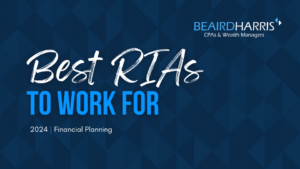
Beaird Harris Ranks #5 in Financial Planning Magazine’s List of Best RIAs to Work For
Beaird Harris has been ranked as #5 out of 52 firms in Financial Planning’s list of Best RIAs to Work for.


RSM has developed this tax planning guide to help you think through opportunities and other considerations for you and your family during the remainder of 2024 and into 2025. We hope this guide will help you evaluate and optimize the tax impact of changing market conditions and new policy developments. To learn more, please review the additional resources in the links below and reach out to us to discuss your specific circumstances.
Below are some of the most common tax opportunities to consider before year-end:
Charitable contributions: Consider whether you have made all your desired charitable gifts before the end of the year to maximize your charitable contribution deduction.
The deduction depends on whether your itemized deductions exceed the standard deduction and may be affected by carryovers from a prior year. If you are over age 70½ and own an individual retirement account (IRA), you may be able to make a charitable gift directly from your IRA of up to $105,000 for 2024.
Most of the income tax changes directly affecting individuals under the Tax Cuts and Jobs Act of 2017 (TCJA) will expire on Jan. 1, 2026, unless new legislation is enacted. While you may wish to wait until the fate of the TCJA is more certain, we strongly recommend evaluating your plans now. Tax planning is time-consuming and requires careful considerations that should not be rushed.
Notably, itemized deductions will face an overall 3% limitation known as the Pease limitation.
Learn more:
The TCJA doubled the lifetime federal estate, gift and generation-skipping transfer (GST) tax exemptions. In 2024, the exemption amount is $13.61 million and is projected to increase to $13.99 million for 2025. If Congress does not extend the TCJA provisions, the exemption amount will be cut in half in 2026.
Taxpayers who wait until late 2025 to act may not maximize future leverage of their gifts. Evaluate your current estate and anticipated future income needs today to determine if gifting now is right for you.
Learn more:
Are you aware that certain generation-skipping transfers could be subject to an additional 40% tax?
The GST tax should be a significant consideration in tax planning for transfers to beneficiaries at least two generations younger than the donor. The GST exemption may be used to protect assets from the GST tax. The GST exemption is equal to $13.61 million in 2024 and is projected to increase to $13.99 million for 2025.
The GST exemption can be allocated to transfers during life or at death to protect assets from GST tax. This allows you to safeguard your wealth and minimize tax exposure, ensuring a more efficient wealth transfer across generations.
To effectively navigate the GST tax, it is essential to:
If the GST exemption decreases in 2026 (as mentioned previously), the ability to fix GST exemption allocation problems may be more limited.
Learn more:
Leveraging assets in a depressed market can be an effective tool in estate and some income tax planning. By taking advantage of high interest rates, you can transfer wealth to the next generation at a historically low tax cost.
Learn more:
If you are contemplating transferring a business interest as part of a business succession plan or ahead of a liquidity event, you should immediately consider potential estate planning opportunities.
Valuations can increase the closer and more concrete a transaction becomes. Valuation discounts may decrease after a letter of intent is executed. These discounts can be helpful for estate planning purposes because:
Thus, you should work with qualified appraisers to determine the proper value of your business interest and coordinate this valuation with the timing of the transfer.
If you make a gift of a business interest for estate planning purposes, the earnings from that interest will no longer go to you; they will go to the donee, such as an irrevocable trust.
As part of this process, you must determine whether you are comfortable losing the cash flow from that business interest. The transaction structure and cash flow projections heavily influence this determination.
Business succession agreements, such as stockholders agreements or buy-sell agreements, are a key part of this analysis, especially for interests that you may wish to hold on to for your remaining lifetime.
In Connelly v. United States, the U.S. Supreme Court addressed whether a buy-sell redemption obligation funded by life insurance proceeds should reduce the company’s value for purposes of the federal estate tax. The court concluded that the company’s value was not reduced by the redemption obligation.
Consequently, the value the decedent’s heirs received was reduced by the additional estate tax on the value of the business interest. If your business has a redemption agreement funded by life insurance, review your agreement and consider making changes to avoid an unintended result.
Transferring a business interest can be time-consuming. There are often multiple strategies to analyze. Upon choosing a strategy, attorneys need to draft documents, appraisers need to prepare valuation reports, and tax professionals need to review the plan for tax reporting purposes. If you are thinking of transferring a business interest for estate planning purposes, start these discussions as soon as possible.
Exams of high net worth individuals are conducted by the IRS Global High Wealth Industry Group, which is made up of experienced IRS auditors and forensic accountants. They commonly start with examining an individual and spread to that individual’s related entities, including partnerships and S or C corporations. Exams conducted by the Global High Wealth Industry Group can last from 18 months to two years.
The following are common items that the IRS examines, as well as suggestions for how to document and support the activity reported on the tax return:
IRS scrutiny is high particularly when significant gains are involved. Agents typically request various executed documents, including:
Additionally, the IRS may inquire about the section 754 election, which allows for a step-up in basis. It is crucial to indefinitely retain copies of any elections filed with the IRS because they can be essential for compliance and future reference.
It’s essential to have comprehensive documentation to support significant gains. Agents typically request various executed documents, including:
These are among the most common subjects of IRS reviews. The agency wants to confirm a loss is valid to offset other income. Of particular interest are sole proprietor business losses reported on Schedule C.
To help substantiate losses, taxpayers should retain:
The IRS may recharacterize ongoing sustained losses as a nondeductible “hobby loss” if there is insufficient proof of intent to generate a profit. Taxpayers need to take active steps to substantiate a profit motive and show the business is operating in a business-like manner.
The following actions can help legitimize a business and illustrate a commitment to profitability:
Taxpayers need to maintain their basis schedules on a contemporaneous annual basis to make sure the losses can be deducted.
The IRS scrutinizes cash and noncash donations. Taxpayers should ensure they receive contemporaneous written acknowledgment letters at the time of a donation, as this documentation is crucial for substantiating their deductions.
Adhering to these guidelines will support compliance and strengthen the legitimacy of deductions claimed.
Even if the statute for a net operating loss (NOL) from a prior year is closed, it can still be scrutinized in the current year to verify its validity. Careful recordkeeping is essential to support compliance and defend against potential IRS inquiries. Diligently retain all relevant documentation related to the NOL, including:
The IRS focuses on differentiating between the two. By maintaining thorough documentation, taxpayers can better demonstrate their active involvement and provide a strong defense against potential IRS scrutiny.
Taxpayers should diligently maintain comprehensive time logs and calendars to document the hours spent on each activity, as this is essential for substantiating material participation. Time logs should be detailed, clearly outlining the hours worked along with descriptions of tasks and duties performed.
Aircraft taxation is complex, and the need for accurate recordkeeping is essential—especially now that this is a formal IRS campaign. Taxpayers that own or use noncommercial aircraft need to evaluate their preparedness for an IRS examination by reviewing their policies, procedures, documentation, flight logs, tax positions and other implications.
The agency typically assumes personal use unless the company can substantiate business use. Therefore, it is essential that a business has readily available records and documentation related to the following:
Source: RSM US LLP.
Reprinted with permission from RSM US LLP.
© 2024 RSM US LLP. All rights reserved. https://rsmus.com/insights/services/private-client/individual-tax-planning-guide.html
RSM US LLP is a limited liability partnership and the U.S. member firm of RSM International, a global network of independent assurance, tax and consulting firms. The member firms of RSM International collaborate to provide services to global clients, but are separate and distinct legal entities that cannot obligate each other. Each member firm is responsible only for its own acts and omissions, and not those of any other party. Visit rsmus.com/about for more information regarding RSM US LLP and RSM International.
The information contained herein is general in nature and based on authorities that are subject to change. RSM US LLP guarantees neither the accuracy nor completeness of any information and is not responsible for any errors or omissions, or for results obtained by others as a result of reliance upon such information. RSM US LLP assumes no obligation to inform the reader of any changes in tax laws or other factors that could affect information contained herein. This publication does not, and is not intended to, provide legal, tax or accounting advice, and readers should consult their tax advisors concerning the application of tax laws to their particular situations. This analysis is not tax advice and is not intended or written to be used, and cannot be used, for purposes of avoiding tax penalties that may be imposed on any taxpayer.

Beaird Harris has been ranked as #5 out of 52 firms in Financial Planning’s list of Best RIAs to Work for.

The IRS’s detailed review of ERC claims uncovers significant risks, leading to a continued moratorium, slow processing of lower-risk claims, and a call for filers…

A U.S. federal tax planning guide for businesses for tax year 2024, including M&A tax planning and ASC 740 tax planning strategies.
Schedule a complimentary call today. We’ll help you get started and learn more about Beaird Harris.